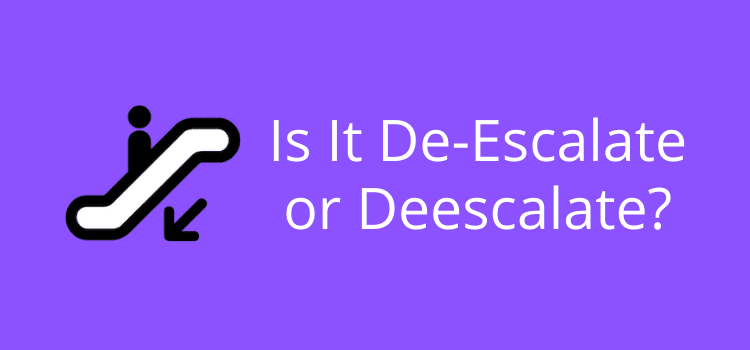In either form, de-escalate or deescalate is an awkward word you would rarely use in writing.
Most dictionaries use the hyphenated form because of the problem with two Es.
But the interesting aspect is how the word escalate was invented. Also, how politicians then exploited its opposite meaning.
Adding the prefix de to negate words is in everyday use now. But it is not always the best or most pleasing choice.
The origins of the word escalate
The first use of the word escalate dates back to 1900.
At the Exposition Universelle in Paris that year, Charles Seeberger, an American inventor, won the first prize.
His invention was a moving wooden staircase. He called it an escalator.
The word derives from either the Latin word scala or French escalier for stair.
Adding the suffix or then indicated it was a tool or machine such as a decorator or calculator.
When Seeberger patented his invention, the word required a capital letter.
The Escalator remained correct until 1950. The US Patent Office then decided that the word was in such common use that it no longer required a capital letter.
From around 1922, the word started to morph into a new verb, to escalate.
It developed many meanings such as shoot up, mount, surge, spiral, grow rapidly, rise rapidly, climb, go up or increase rapidly.
How the word de-escalate came into use
According to The Guardian, the first recorded use of the word escalate, meaning to increase in stages, appeared in The Manchester Guardian in 1959.
It was in the context of elevating from traditional warfare to nuclear war.
But it was a word that was prime to have a negative form. For politicians, the words reduce or decrease didn’t carry much weight.
Words like decertify, debrief and deregulate had become popular with politicians in the 20th century. So it was a natural leap to add the de prefix to escalate.
From around 1964, the word de-escalate came into being.
You only need to do a quick search on the UK Parliament website for de-escalate to discover how frequently the word is used in a political context.
The problem with the word de-escalate
Grammatically, escalate is generally intransitive, so it doesn’t require an object.
The price of oil is escalating.
But de-escalate is usually transitive, so it needs an object.
The government wants to de-escalate tensions with the unions.
Because of this, there is an inconsistency in use when using the positive or negative form of the verb.
Outside of politics, it would be far better to use less colorful vocabulary in writing.
The price of oil is increasing.
The government wants to reduce tensions with the unions.
But for politicians, increasing and reducing don’t convey the same critical or urgent sense.
Other uses of escalate
A newer meaning is moving up a stage or stages.
You often hear the expression when it relates to customer complaints.
I will escalate this issue to my manager.
It has become a popular business buzzword to say that something is moving up one or more levels.
The decision to terminate the contract will need to escalate from the CEO to the board of directors.
However, in corporate-speak, the negative form is rare.
Choosing appropriate vocabulary
Good writing is always about making the best vocabulary choices and avoiding weak words.
I doubt that escalate and de-escalate would be appropriate choices for most authors and writers.
But if you are writing political thrillers, perhaps there may be some uses.
Just make sure you use a hyphen as you would with similar words such as de-emphasize, de-ice and de-energize.
For all other types of writing, it would be better to use a thesaurus and look for alternatives to increase and reduce.
Summary
Sure, you might seldom use the word.
But it helps to know how to use it and get your orthography right.
Increasing, expanding, improving, or enlarging your grammar and lexical knowledge is one fun part of being a writer.
In that last sentence, perhaps I should have avoided using weak ing words.
But I’m not writing a novel. So I’ll de-escalate the point and excuse myself.
The post De-Escalate Or Deescalate? An Unsightly Word Either Way appeared first on Just Publishing Advice For Writers and Authors.
Go to Source
Author: Derek Haines
